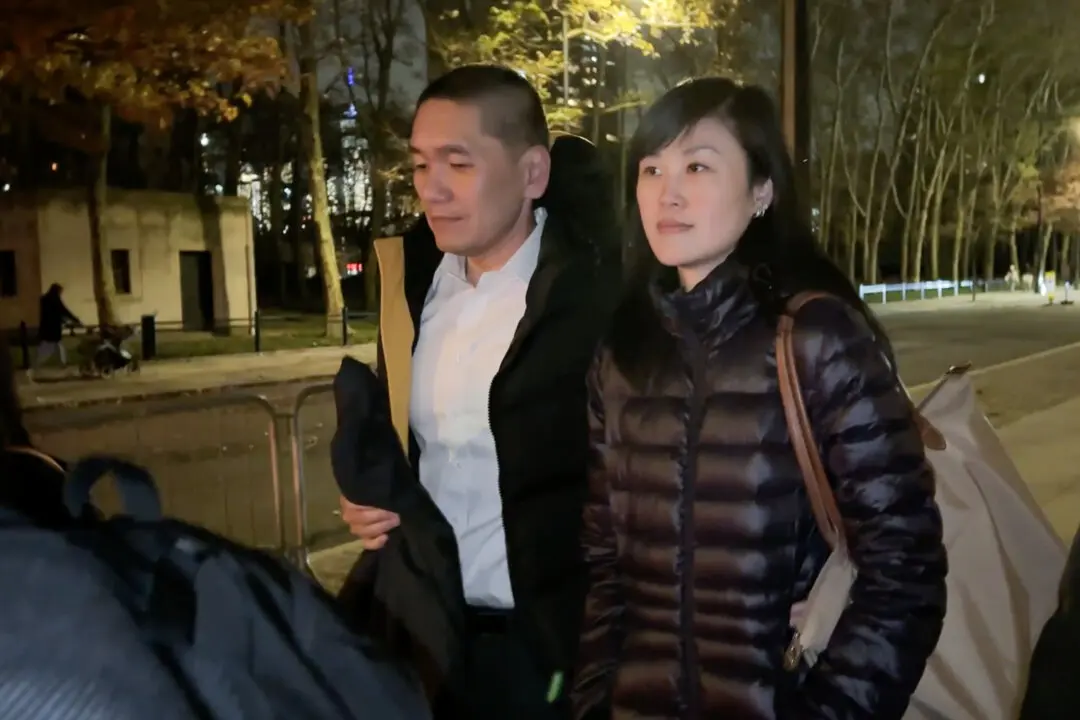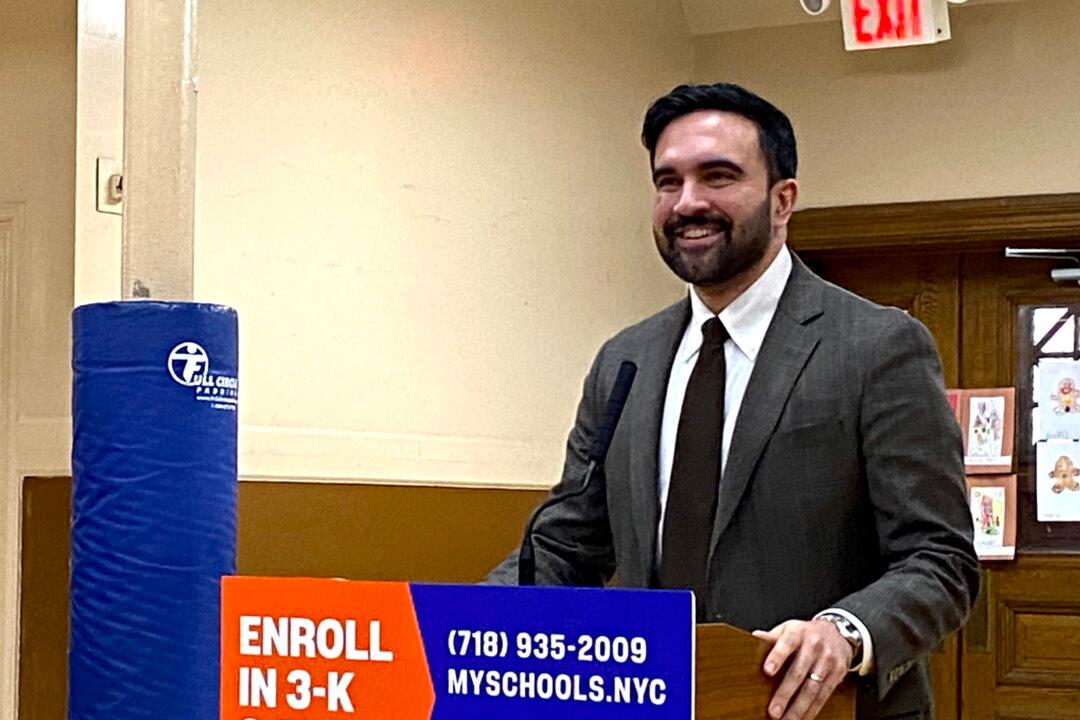NEW YORK—Starting in April, New York City will have one more defense against the flu.
A new paid sick leave law will go into effect then. It will allow more workers to take time off when they’re sick without losing pay, or even their jobs.
It also means sick children will be able to stay home, since their parents will be able to take time off to care for them. Schools, where colds can spread quickly, will likely see the benefits first.
“I am always hoping we don’t have another flu season ’til we get this passed,” Manhattan Borough president and former three-term City Council member Gale Brewer said.
Brewer spearheaded the issue after school nurses from Queens approached her during the spring 2009 H1N1 outbreak. School nurses were inundated with sick children who couldn’t go home.
“The line is out the door!” Brewer recalled the school nurses telling her. She didn’t understand why the children were still at school. Sick with the flu, they should be at home.
“No, no, no, they can’t go home, nobody is picking them up,” Brewer recalls the nurses explaining.
Teachers, understandably, didn’t want sick children in their classrooms passing on the flu, but working parents with one or more low-wage jobs couldn’t afford to take time off to care for their children. So, the children ended up in the care of the school nurses. When swine flu hit in 2009, schools were the epicenter of the H1N1 outbreak.
Expanded Benefits Under de Blasio
Public health isn’t the only concern behind mandating paid sick leave. Announcing an agreement with Council Speaker Melissa Mark-Viverito Jan. 17, Mayor Bill de Blasio said sick leave will be expanded to include 500,000 more New Yorkers. He said providing sick leave is about “protecting the security of family economies.”
De Blasio said those families struggling every month to make rent shouldn’t have to chose between their health and keeping a roof over their children’s heads.
A paid sick leave bill finally passed City Council in June 2013.
Introduced in 2010, that bill was held back for three years by then-Speaker Christine Quinn because of business concerns.
After Mayor Michael Bloomberg vetoed the bill, City Council finally overrode the veto with Quinn’s support.
Now, the new council wants to expand that paid sick leave bill to require all businesses with five or more employees to provide the benefit. (Previously it was limited to businesses with 15 employees).
On Jan. 17, Brewer joined de Blasio, Mark-Viverito, Public Advocate Letitia James, and a host of City Council members to announce they would move on the legislation right away.
De Blasio said he wants the expansion effective in April, when last year’s law goes into effect. That law required businesses with 15 or more employees to provide the benefit, and included a provision to shut off the benefit if the economy was struggling.
The new legislation will affect 355,000 more workers, according to the mayor’s estimate. It will also eliminate the phase-in from the original legislation that gave those with 15–20 workers until mid-2015 to comply with the law.
Left out of the original bill, the manufacturing sector will now have to provide paid sick days as well. Rather than just the federal allowance for use of a sick day to take care of a spouse or child, the legislation will allow an employee to use a sick day to care for grandparents, grandchildren, and siblings.
Employees accrue sick leave over time. They earn one hour of paid leave every 30 hours worked. Those at businesses with less than 20 on staff can only earn up to five days per year. Those at larger employers can earn up to nine days. New employees start accruing hours only after 90 calendar days.
A 2010 study by the Partnership for New York City found 88 percent of New York City workers already have access to paid sick leave. For those at small businesses, that number goes down to 62 percent of workers. Those that don’t get paid sick leave tend to work at small businesses or in construction, retail, hospitality, and restaurant industries.
Small Business Impact
The new legislation means costs will go up for many of the city’s smallest small businesses. Business groups fought hard against paid sick leave for years, but opposition from the Partnership for New York City and the Queens and Brooklyn chambers of commerce seemed toned down after the mayor’s announcement Jan. 17.
Mandated paid sick leave is relatively new in policy circles. San Francisco voters passed the first such citywide ordinance in 2007. Washington, D.C., soon followed suit in 2008, Seattle in 2011, and Portland, Ore., in 2013. Newark’s City Council passed a paid sick leave bill Jan. 28. Only Connecticut mandates paid sick leave statewide.
A 2011 report by the Institute for Women’s Policy Research (IWPR) analyzed the effects of the law in San Francisco, finding that one-third of the workers did not use the paid sick days, contradicting speculation about rising wage costs. But their close survey of 727 San Francisco employers found 14.2 percent of them responded that the law had a negative impact on their profitability.
NY Business Owner’s Concern
Steve, a New York City carwash owner who preferred to keep his last name private, said he is concerned about profitability. He said with the extra costs, and the burden of extra record keeping, small businesses can’t afford it.
“It’s forcing businesses to give a package that should be [decided by] a free market,” said Steve. He recently paid an employee while she took time off for surgery. He said he is happy to pay his employees to stay home when they are actually sick, but he is concerned they could take advantage of the paid leave when they party too hard.
“There is always a guy that drinks too much, and every Monday he starts calling in sick. Now he is going to start taking those five sick days on Monday, because he can. And in the meantime you need him there on Monday. If he is not being paid he will figure it out to be responsible enough to come in on Monday. … Who’s going to pay for it in the end? The consumer?”
Looking Ahead
The overall effect on the local economy is not expected to be negative.
In fact, the overall impact on the local economy and on public health is expected to be positive. Workers will stay home when sick, reducing transmission of disease, and ultimately increasing productivity at work.
“We were constantly calling other cities,” said Brewer, who said she spoke with chambers of commerce in cities where sick leave had been enacted and all assured her the overall effect of the law had been positive.
A 2009 study of San Francisco businesses by the Urban Institute found that most employers were able to provide the paid sick leave with minor to moderate effects on their business.




